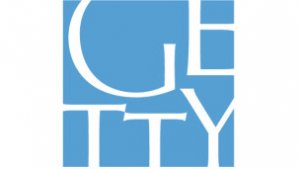Getty Scholar Grants
Annual Theme: Extinction

The Getty Scholars Program supports researchers in advancing knowledge of the arts and humanities and producing cutting-edge scholarship that contributes to the understanding and preservation of cultural heritage. While in residence, scholars have the opportunity to spend significant time at one of the world’s premier art history collections while contributing to an international community committed to intellectual exploration and exchange. Scholars may be in residence at the Getty Center or Getty Villa.
Background
History
Since 1985, the Getty Scholars Program has hosted nearly 1,500 residential scholars from over fifty countries to conduct research on topics related to the annual theme while residing in Los Angeles. Selected projects have spanned geographical regions and time periods, from ancient to contemporary eras. Getty receives between 300 and 400 applications each year and awards fellowships to about twenty applicants annually.
Structure
A mix of senior scholars and junior fellows are selected for the Scholars Program cohort. The cohort's research projects are focused on an annual theme. The three main grant categories are:
This page provides information about Scholar Grants for established researchers and professionals residing at the Getty Center.
- Scholar Grants for established researchers and professionals who have held PhDs for at least 5 years and/or possess strong records of publication and professional activity, at the Getty Center or Getty Villa
- Postdoctoral Fellowships for recently granted PhDs at the Getty Center or Getty Villa
- Predoctoral Fellowships for PhD candidates at the Getty Center
Applicants for 2024–2025
Application Timeline
Applications open on July 1, 2023 and close on October 2, 2023.
Annual Theme: Extinction
Each application cycle has its own theme that addresses a consequential topic in the arts and humanities. The scholar cohort for that year carries out research projects that respond to this theme, which serves to bridge the various subfields and methodologies of those in residence and provides shared terrain for collaboration, connection, and exchange while also opening up new interdisciplinary conversations.
Extinction
The arts have the capacity to mitigate against cultural loss by visualizing, capturing, and interpreting aspects of the fleeting, the ephemeral, and the unrecoverable. In this moment of extreme environmental decay and monumental epidemic loss, the Getty Scholars Program invites applications on the pressing topic of extinction and its bearing on the visual arts and cultural heritage. Scholars are asked to contemplate how representational practices are deployed to cope with the precarious survival of plants, animals, and humans; the ever-present specter of species-level extinction and resource exhaustion; and, at the most extreme pole, the brutality of mass atrocity. On another level, atrophy, decay, and obsolescence constitute the temporal dimensions of certain artistic practices, especially as creative approaches, technologies, media, formats, and ideals become outmoded or superseded. The finality of disappearance may also portend a certain amount of hope for rebirth, innovation, or recovery.
This year’s theme welcomes research topics that explore that which is lost, but also the urgent impulse toward preservation and permanence. Beyond loss, destruction, or mortality, the topic also seeks to explore the creative and productive possibilities that extinction may enable.
Guiding Questions
- How have recent scientific or technological advances made it possible to visualize lost sites, beings, and objects?
- What new habitations and communities have emerged or survived from the processes and effects of extinction?
- Historians, archaeologists, and cultural heritage scholars work actively to preserve and protect certain categories of visual, material, and built culture. Yet there are cases in which obsolescence is warranted, even invited. What do we choose to save and why? Who decides upon the criteria and what is the logic?
- Many forms of human expression are not meant to endure, such as performance, storytelling, music, and dance. What is the relationship between artistic forms and cultural practices that have been lost and their more durable records and traces?
- The most devastating loss is that of entire cultures and groups, sometimes targets of intentional annihilation. How can precarious forms of indigenous knowledge and fragile cultural identities that are in danger of extinction be conveyed, preserved, and represented? How might communities challenge predictions and presumptions of extinction?
African American Art History Initiative (AAAHI) Fellowship
In addition to the annual theme, grants are available under the AAAHI Fellowship. This residential program provides financial support and housing to scholars who are expanding critical inquiry of African American art and its frameworks. As part of the larger scholar year cohort, AAAHI Fellows have opportunities to present their research and receive feedback from an interdisciplinary group of peers. While proposals do not have to address the concurrent annual theme, they may highlight any salient intersections with it.
AAAHI will support two fellows to generate new knowledge in the expanding field of African American art history. Projects that propose engagement with Getty’s growing collections of archival and primary source material related to African American art history—particularly post-World War II—are welcome. However, relevance to Getty holdings is not a project requirement. We invite applications from scholars who focus on African American art and visual culture in all time periods and media and in a broad range of theoretical and methodological traditions. Applicants should indicate how their project would align with AAAHI's aim to make African American art history more visible to the public and accessible to the scholarly community worldwide.
Grant Details
The information on this page pertains to Scholar Grants for established researchers and professionals at the Getty Center. Visit the Pre- and Postdoctoral Fellowships or the Getty Scholars Program at the Villa pages for details about those specific programs.
Eligibility
Scholar Grant applicants should have received a PhD before September 1, 2020. Applicants from associated fields who do not hold a PhD but have commensurate professional experience will also be considered.
Applicants who received their degree after September 1, 2020 should apply for a Postdoctoral Fellowship.
Terms
Scholar Grant recipients at the Getty Center may be in residence from three to nine months and receive varying stipends as detailed below*:
*AAAHI Fellowships are limited to nine-month residencies and are granted $65,000 stipends for established scholars. See the Pre- and Postdoctoral Fellowships page for information about AAAHI Fellowship stipends for doctoral candidates and recent PhD degree recipients.
See the overview of the Getty Residential Scholar and Fellow Program for further details about stipends, housing, healthcare, and more.
- Three-month residency: September–December/January–March; $21,500 stipend
- Six-month residency: September–March/January–June; $43,000 stipend
- Nine-month residency: September–June; $65,000 stipend
Application Process
How to Apply
Applicants need to complete and submit the online Getty Scholar Grant application form by the deadline, which requires the following attachments:
*Applicants for the AAAHI Fellowship are not required to address the annual theme. Rather, they should describe how their projects will generate new knowledge in the field of African American art history.
- Project Proposal (not to exceed five pages, typed and double-spaced): Must include a description of the applicant's proposed plan of study. The description should indicate 1) how the project addresses the annual theme* and 2) how it would benefit from the resources at the Getty, including its library and collections.
- Curriculum Vitae
- Optional Writing Sample
Decision Notification
Applicants will be notified of their application outcome approximately six months after the deadline.
Contact
Email: researchgrants@getty.edu
Attn: Getty Scholar Grants
